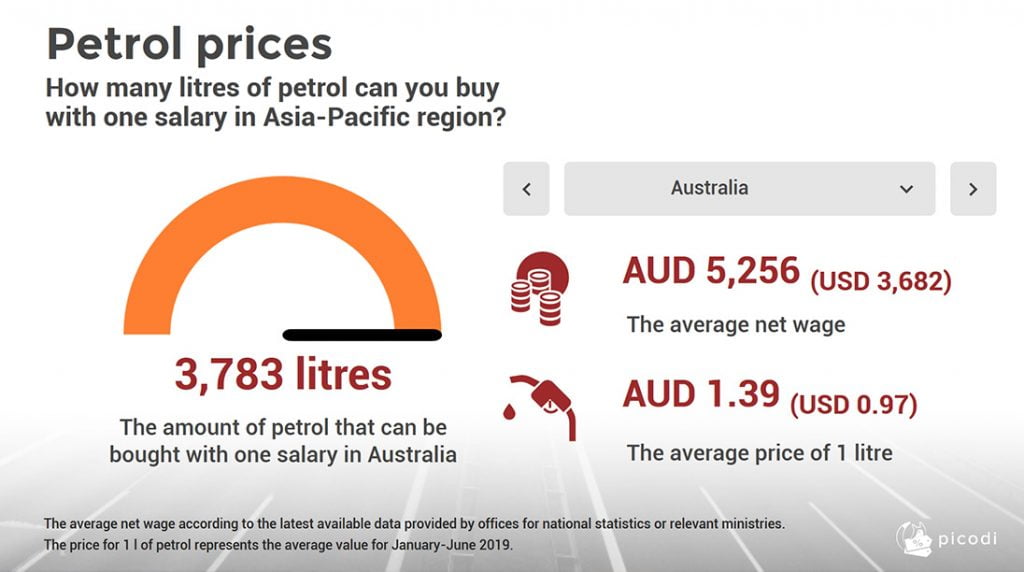Global survey shows Australians are well off when it comes to affordable pump prices
A WORLDWIDE survey of fuel pump prices in different countries, matched to average incomes, shows Australians are better off than most in terms of the number of litres of petrol they can afford to buy on their average wage and better off than drivers in any other Asia-Pacific country.
The research by Picodi compared the average fuel prices from over 100 countries and then cross-referenced them with respective average wages. The result is a petrol index which shows how many litres of fuel people in various countries can buy with their salary.
Picodi is a Polish-based shopping coupon and discounts company servicing 44 countries worldwide, including Australia.
The Picodi research team found that:
- Australia takes the lead among all Asia-Pacific countries. With the average Australian wage you can get 3783 litres of petrol.
- In contrast, Filipinos can afford only 158 litres.
- Globally, the people of Qatar are the most advantaged. They can buy 6476 litres on their average salary.
- The worst off are the Cubans who can purchase only 26 litres of petrol with an average salary.
Picodi said in a statement that petrol prices were dependent on many different factors such as crude oil prices on the international markets or taxes or margins established by service station owners.
“The value of one litre of petrol at the retail point of sale may change overnight, in some countries even by the hour,” the company said.
Bearing in mind the fuel market instability, Picodi’s analysis team studied how many litres of petrol you can buy with the average wage in Australia compared with other Asia-Pacific countries as well as worldwide. It based its results on average fuel prices in the first half of 2019.
In our region, the cheapest petrol can be found in Malaysia, where on average for one litre of petrol you would have to pay 49 cents (converted from ringgits) but that only buys 1707 litres on the average wage.
In contrast, the most expensive country in which to fill up in this region is Hong Kong, where the average price for one litre is $2.15. But the drivers of Hong Kong cover very little distance and wages are relatively high.
The best ratio of petrol price to the average salary in our part of the world is Australia. With the average Australian wage you can get 3783 litres of petrol. Japan placed second with 2006 litres and South Korea, with 1908 litres, took third place among the 17 researched countries in this region.
Lower in the ranking are countries like Pakistan, Cambodia and the Philippines. In these countries, the average salary allows for buying no more than 200 litres of petrol.
The study showed that possessing a rich supply of natural resources does not always mean that petrol will be more accessible for an average consumer.
For example, in oil-rich Nigeria where petrol costs 40 cents a litre, people on an average wage get so little income that they can only buy 501 litres.
The analysis of prices and wages in more than 100 countries on six continents produced an overall winner – Venezuela – where one litre of petrol costs just $0.000000002. With the average salary amounting to around $29, Venezuelans could buy more than 14 billion litres of fuel.
But, asked Picodi, “do the citizens of a country haunted by crisis and inflation have reasons to triumph”?
The actual leaders of the ranking are the Persian Gulf countries. In Qatar, Kuwait and the United Arab Emirates, the price of petrol is between 40 and 60 cents a litre and, based on average salary, the citizens of those countries can buy between 4900 to 6500 litres of fuel.
The high positions of countries like the United States (77 cents/4711 litres) and Canada ($1.01/2511 litres) can be explained not only by high salaries but also the amount of domestically extracted oil.
Switzerland (3388 litres) and Luxembourg (2827 litres) stand out with high incomes only.
The lowest amount of petrol can be bought in Madagascar (42 litres), Tajikistan (131 litres) and Zambia (137 litres).
Extracted from Go Auto News Premium
